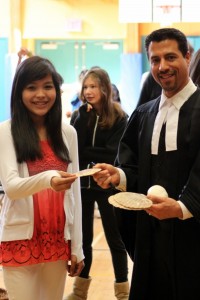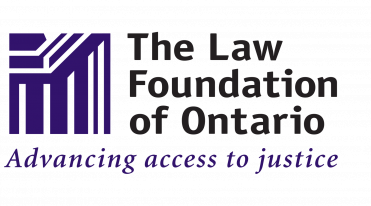 Many young people see contact with the justice system as anything but fun. The People’s Law School has changed that for 10,000 students across remote parts of B.C., the Yukon, the Northwest Territories, and Saskatchewan.
Many young people see contact with the justice system as anything but fun. The People’s Law School has changed that for 10,000 students across remote parts of B.C., the Yukon, the Northwest Territories, and Saskatchewan.
The People’s Law School works to make sure we all know and can exercise our legal rights. As part of this work, their Justice Theatre group developed two interactive plays about cyberbullying and hate crimes. They took the plays on tour to schools in 23 communities, including small and rural communities that are often missed.
There were no passive audience members at these plays. As fictitious trials were acted out, students took on the role of jurors and learned first-hand about the justice system and how it can be there for them when they face tough issues. The experience also reminded students that they’re responsible for their own actions and those actions can have a powerful effect on peers.
The Justice Theatre made a special effort to reach First Nations communities with the Access to Justice Tour and to adapt to community needs. For example, the group worked with Elizabeth Moore of the Haida Gwaii Legal Project to incorporate the idea of restorative justice. This concept puts emphasis on victims, offenders and community members deciding together how to repair harm done. The People’s Law School will be collaborating with Elizabeth again on future projects related to the concept of restorative justice.
“The Justice Theatre’s performances on the topic of hate crimes made a strong impression… It is very important to our students to better understand the justice system and how our First Nations values can be recognized in the system by including restorative justice in the process,” Elizabeth said.
Justice Theatre director Rob McAninch tells us a grant from The Law Foundation of Ontario’s Access to Justice Fund allowed them to take these plays to communities they could never have reached otherwise. The grant also let them test their ability to offer services in a new province – Saskatchewan – and to forge new connections with organizations like the Public Legal Education Association of Saskatchewan.
The Law Foundation of Ontario launched the Access to Justice Fund in May 2010. As of November 2013, the Foundation has awarded 97 grants, for a total of $13.6 million, from the fund. Grants are made for projects focused on linguistic and rural access to justice, Aboriginal issues, self-help, family violence, and consumer rights. It is a permanent fund that channels cy-près awards into innovative projects for greater access to justice. Grants have been made for provincial, multi-province, and cross-country projects. The fund is open to receive new cy-près awards. At the current time, the fund is closed to new applications.

